- info@ficci.org.bd
- |
- +880248814801, +880248814802
- Contact Us
- |
- Become a Member
- |
- |
- |
- |
- |
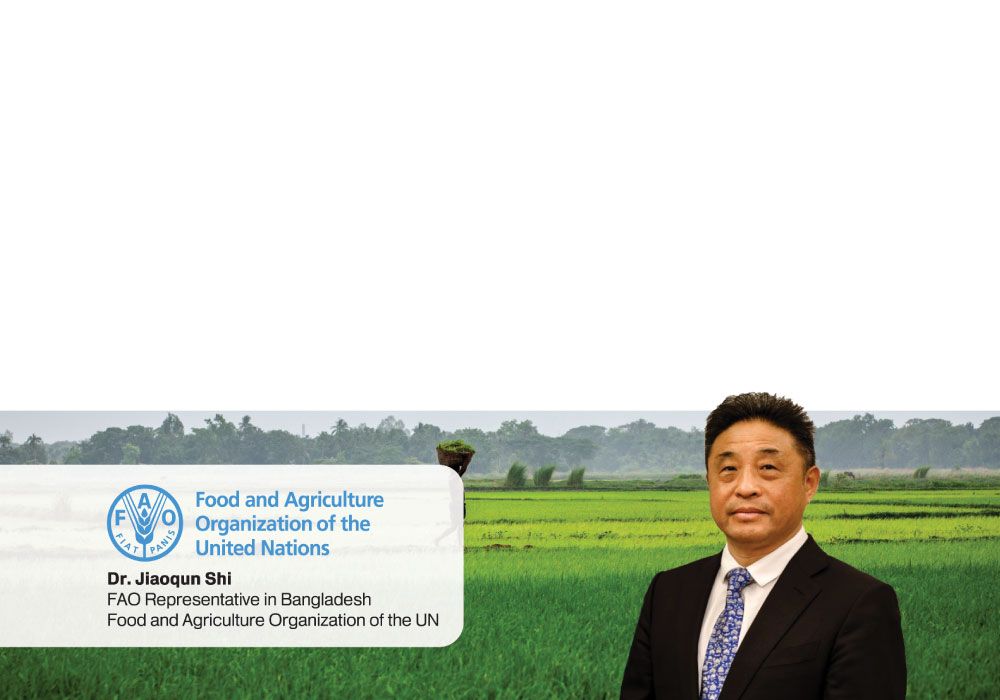
The agricultural sector in fundamental to the economy of Bangladesh, providing livelihoods for millions and driving food security, serving as a lifeline for millions and about 45 perceht of Bangladeshis are employed in the agricultural sector. It has been instrumental in bolstering national food security and uplifting rural livelihoods. More than 85 percent 2 of farmers are smallholders with less than a hectare of land each, whereas 55.2 percent 3 of the agricultural labour force is female. As the economy of Bangladesh continues to develop, agriculture will play a significant role.
Over recent decades, Bangladesh has achieved remarkable progress in agricultural productivity, attaining self-suffi- ciency in staples like rice and enhancing food security for countless communities. Challenges related to production, post-production, commercialization, and climate vulnerability are curtailing productivity, value addition, and profitability. Future productivity will depend on sustainable mechanization, diversification, management of agroecosystems, and commercialization. Recognizing the importance of robust agribusiness and sustainable agricultural practices, the Food and Agriculture Organization of the United Nations (FAO) is working closely with the Government of Bangladesh to support technical innovations and transformations that can uplift the entire sector.
The Government of Bangladesh, in collaboration with FAO and the private sector, has outlined a comprehensive long-term plan centered on four Priority Investment Areas (PIAs) aimed at sustainable agricultural development. These PIAs include:
- agro-processing, marketing, and commercialization
- climate-resilient, climate-smart agriculture
- irrigation and water management
- post-harvest management including cold chain and supply chain management
This plan leverages technical expertise from FAO, the government's policy framework, and private sector investment to create a balanced approach to transforming Bangladesh's agriculture sector sustainably.
FAO is a specialized agency of the United Nations, dedicated to spearheading global efforts to eradicate hunger under the guidance of its member states. FAO works alongside these nations to identify and address key challenges in food security, agriculture, and rural development. Since Bangladesh joined FAO in 1973, the organization has been a crucial partner in the country's ongoing development journey.
FAO operates with a clear mandate aimed at achieving a more resilient, sustainable, and inclusive agricultural sector. FAO's Strategic Framework contributes to the achievement of the 2030 Agenda and three Global Goals of Members by supporting the transformation to MORE efficient, inclusive, resilient and sustainable agrifood systems for Four Better: Better production, better nutrition, a better environment, and a better life, leaving no one behind.
--------------------------------------------------------------------
1. BBS Quarterly Labour Force Survey 2023: https://bbs.portal.gov.bd/sites/default/files/files/bbs.por-
tal.gov.bd/page/96220c5a_5763_4628_9494_950862accd8c/2024-01-25-10-03-aad49f9f12bf7ab7c20903972607f7a3.pdf
2. FAO Documents: https://www.gafspfund.org/sites/default/files/inline-files/G-
CP%20BGD%20064%20GAF%20Terminal%20Report%2022-09-2023.pdf
3. World Bank Gender Data Portal 2022: https://genderdata.worldbank.org/en/indicator/sl-empl-zs
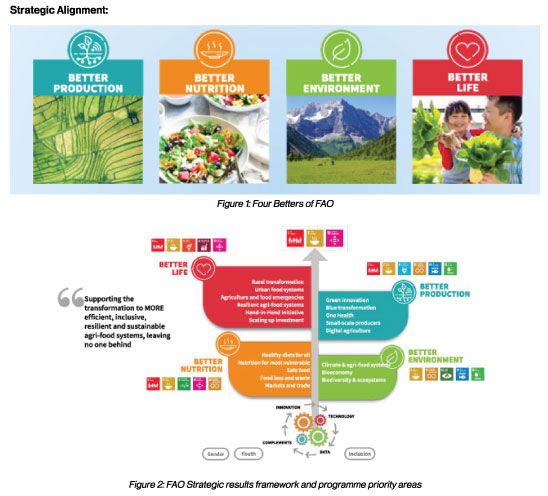
• FAO's work in Bangladesh is guided by the Country Programming Framework (CPF), aligned with FAO's "Four Betters," Programme Priority Areas (PPAs), Regional Priorities, and the Bangladesh Government's Eighth Five-Year Plan.
• It also aligns with the United Nations Sustainable Development Cooperation Framework (UNSDCF) 2022-
2026, the Sustainable Development Goals (SDGs), and FAO's Strategic Framework 2022-2031.
• FAO Bangladesh CPF 2022-2026, which has an indicative budget of USD 125 million
• FAO's overall vision and viewed through the guiding lens of SDG 1 (No Poverty), SDG 2 (Zero Hunger), and SDG 10 (Reduced Inequalities).
• FAO is the custodian UN agency for 21 SDG indicators
The CPF 2022-2026 outlines FAO's strategic priorities, key areas of technical cooperation, and medium-term country-level programming activities, organized around Four main pillars:
1. Productive, diversified, sustainable and inclusive agro-economic growth
2. Healthy, safe, and nutritious food for all
3. Climate resilience and nature-based, low-carbon sustainable development 4. Gender equality and youth development
FAO country office has four (4) corporate flagship initiatives:
▸ Hand-in-Hand Initiative (HiHi)
▸One Country One Priority Product (OCOP)
▸Digital Village Initiative (DVI)
▸ Green Cities Initiative (GCI)
-----------
4. FAO-CPF 2022-2026 (3.2; page 13): https://openknowledge.fao.org/server/api/core/bit-
streams/063b1d2e-5594-43ff-a629-cd671e3bb2d4/content
 Hand-in-Hand Initiative (HiHi)
Hand-in-Hand Initiative (HiHi)
In Bangladesh, the Hand-in-Hand Initiative supports investments addressing post-harvest losses. While crop production has increased, storage infrastructure to reduce food loss and boost exports has been lacking. Therefore, investments focus on cold storage and agro-pro- cessing facilities to reduce post-harvest losses by 25-50 Percent.
One Country One Priority Product (OCOP)
In Bangladesh, the One Country One Priority Product (OCOP) initiative highlights jackfruit as Special Agricultural Products (SAPS). This initiative aims to promote these fruits' sustainable production and market potential, supporting inclusive, profitable agrifood systems while leveraging their unique agricultural value in the country. FAO is keen to enhance support in exporting mangoes from Bangladesh to promote the product at global, regional and local levels by using the unique tools Geographical Indications Environment & Sustainability (GIES) to trace the geographical origin of a SAP.
Digital Village Initiative (DVI)
The flagship DVI has played a crucial role in establishing 55 Digital Village Service Centers across the northern and southern regions. These centers are dedicated to delivering a range of digital services, from agricultural solutions to educational resources and billing services, aimed at supporting smallholder farmers, including youth and women. FAO remains committed to driving agricultural transformation through digitization.
Green Cities Initiative (GCI)
The Green Cities Initiative (GCI) in Bangladesh was implemented through a global project "Green Cities initiative (GCI): building back better for climate and resilient sustainable transitions". FAO worked with the City Government and local universities to promote GCI actions, facilitated multi-stakeholder cooperation, demonstrating the municipality's commit- ment to comprehensive and sustainable green urban development. These initiatives highlight a steadfast dedication to fostering a supportive atmosphere for effective and inclusive policy formulation. The Local Government in Bangladesh developed Green City Charter Vision, established Green City Working Groups, and developed GCI curriculum in local schools as well.
FAO's Portfolio in Bangladesh:
FAO's portfolio in Bangladesh is extensive, addressing multiple aspects of agriculture, food security, and sustainable development to support the country's goals in alignment with its national strategies and the Sustainable Development Goals (SDGs).
- Implemented more than 380 Technical Assistance projects with a combined budget of USD 420 million since 1973 when Bangladesh joined FAO.
- A total of 29 active projects with a total budget of USD 56.84 million while more than 18 global and regional projects are also operational in the country.
- FAO projects encompass a wide range of focus areas, including crops, fisheries, livestock, nutrition, food safety, urban food systems, agricultural transformation and digitalization, emergency response, climate resilience, and forestry.
- Nine ministerial partners including the Ministry of Agriculture, Ministry of Food, Ministry of Fisheries and Livestock, and the Ministry of Environment, Forest and Climate Change.
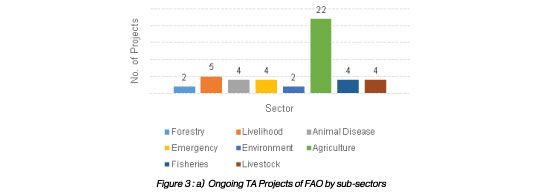
FAO's Project related to Agricultural Transformation
▶ The ACCESS Project empowers smallholder farmers by strengthening producer organizations (POs) to address community needs. Through capacity-building, investment grants, and monitoring, the initiative enhances access to finance, markets, and technology, boosting livelihoods. Partnering with the Sara Bangla Krishak Society (SBKS), FAO has helped over 10,000 farmers achieve a 35 percent income rise and mobilize USD 1M in financing. ACCESS supports 8,000 smallholder farmers across 80 POS in 27 agribusiness clusters within Bangladesh's southern coastal and northern drought regions. With USD 4.75M invested, it fosters climate-smart investments via revolving loan funds and external financing partnerships, driving sustainable, inclusive farming communities.
▶ Technical Assistance to Smallholder Agricultural Competitiveness Project (SACP) enhanced resilience and income of 250,000 households in Bangladesh's southern coastal zones by diversifying crops, improving productivity, and strengthening market access through capacity-building and technical assistance.
▶Technical Assistance to the SACP and RAINS projects enhance agricultural resilience and food security for smallholders in Bangladesh where SACP promotes high-value crops and market competitiveness, while RAINS addresses food and nutrition resilience amidst climate and economic shocks. By integrating climate-smart techniques, boosting productivity, and strengthening supply chains, these initiatives drive income growth and sustainable rural livelihoods. Training programs like Farmer Business Schools and participatory rural appraisal (PRA) equip farmers with essential skills for market engagement. Together, the projects build climate-adaptive, inclusive systems, mitigating food insecurity and fostering sustainable economic growth in rural areas.
▶ Technical Support to Agriculture Sector Transformation Programme of Bangladesh drives sustainable agro-economic growth through policy analysis, investment planning, and technology promotion. It develops regional investment plans for six "hotspots" under the Bangladesh Delta Plan 2100 and provides tools to evaluate ATP-related public spending. Through the PARTNER initiative and South-South and Triangular Cooperation (SSTC), it supports innovative technologies and prioritizes partnerships to enhance agricultural transformation. These efforts aim to address investment gaps, strengthen institutional capacity, and foster sustainable agricultural growth in Bangladesh.
► FAO supporting the host communities adjacent to twelve Rohingya camps and four sub-districts (Cox's Bazar Sadar, Ramu, Ukhia, Teknaf) in Cox's Bazar, Bangladesh, with a focus on improving food security and resilience. Cox's Bazar, one of the poorest districts in Bangladesh, is home to the world's largest Rohingya camp. Both the FDMNS and the host communities face severe food insecurity, with the latter being among the most vulnerable in the country. According to the February-March 2024 Integrated Food Security Phase Classifi- cation (IPC) 5, 45 percent of FDMNs and 30 percent of the host communities in Cox's Bazar are in food crisis. FAO supports (through four active projects at cox's bazar) agricultural livelihoods, provides technical assistance to local institutions and NGOs, and works to restore socio-ecological systems through sustainable land management and forest restoration. These integrated efforts aim to address immediate needs while promoting long-term sustainability and resilience.
Altogether, around 11 projects 6 are currently underway in Bangladesh, contributing to the agricultural transformation projects on development of the jackfruit value chain, community-based climate-resilient fisheries and aquaculture development, inclusive investment in agri-food systems through the Hand in Hand Initiative (HIH) etc.
FAO's Aspiration in the Coming Years: Supporting Bangladesh's LDC Graduation
Bangladesh is on the verge of graduating from its status as a Least Developed Country (LDC), a pivotal milestone reflecting significant strides in economic growth and human development. However, this transition also presents challenges, particularly the potential reduction in access to certain forms of development assistance, including preferential trade agreements that have helped bolster exports in the past. As Bangladesh prepares for this transition, the role of the FAO will be crucial in ensuring that the country not only navigates this shift successfully but also builds a sustainable foundation for continued growth in the post-graduation era.
In collaboration with the Ministry of Agriculture, its agencies, and FAO, several key priority areas have been identified as part of a Smooth Transition Strategy (STS) for LDC graduation. Some of these priority areas include:
▸ enhance agricultural production by promoting technological innovations.
▸ enabling global investment environment and inviting investment in establishing modern agricultural industries.
▸ promote Sustainable Agricultural Mechanization (SAM) through adopting appropriate scale machineries which are commercially viable, socially acceptable and environmentally sustainable.
▸ increase production of import-dependent agricultural products to reduce import of agricultural products dependent on global aid.
----------------------------
5 IPC: https://www.ipcinfo.org/ipc-country-analysis/details-map/en/c/1156935/?iso3=BGD
▸ reduce dependence on chemical fertilizers by motivating farmers to use locally produced organic fertilizers. ▸ increase rainwater harvesting, and encourage the use of solar powered irrigation.
▸ increase public-private (co-financing) cooperation instead of ongoing financial incentives to develop emerging agribusiness entrepreneurs.
▸ capacity building of producers through effective research and technology application aimed at increasing exports.
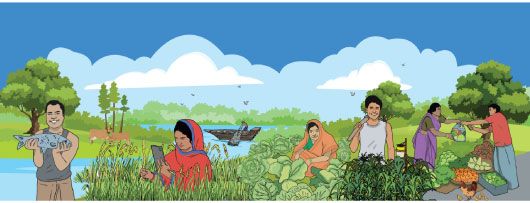
Long-Term Vision for Post-Graduation Growth:
FAO's overarching aspiration is to help Bangladesh transform its agricultural sector into a dynamic, diversified, and climate-resilient system capable of thriving in the competitive global marketplace. This vision includes transitioning from aid dependency to self-reliance, where agribusinesses play a central role in driving economic growth and poverty reduction. Through this support, FAO seeks to ensure that Bangladesh's journey toward middle-income status is sustainable, equitable, and inclusive.
By investing in human capital, technology, and resilient infrastructure, FAO's approach not only aids Bangladesh in meeting the immediate challenges of LDC graduation but also ensures long-term sustainability and prosperity for its agricultural sector. Through a strategic mix of digital innovation, climate resilience, inclusive growth, and robust policy frameworks, FAO's continued support will be instrumental in enabling Bangladesh to secure a successful and prosperous future.
Short Bio:
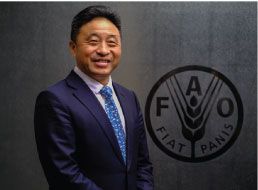 Dr. Jiaoqun Shi, FAO Representative in Bangladesh Dr. Jiaoqun Shi has joined as the new Representative for the Food and Agriculture Organization of the United Nations (FAO) in Bangladesh on 31 December 2023. Shi, a national of China, holds a Master of Laws and a Bachelor of Arts in History from Wuhan University, and a Doctor of Philosophy in Law from the National Academy of Governance in China. He joined FAO in 2019 as Senior Compliance Advisor to the Deputy Director-General at FAO headquarters in Rome, Italy and since January 2021, he had been serving as Special Adviser at the FAO Regional Office for Asia and the Pacific (RAP) in Bangkok, Thailand.
Dr. Jiaoqun Shi, FAO Representative in Bangladesh Dr. Jiaoqun Shi has joined as the new Representative for the Food and Agriculture Organization of the United Nations (FAO) in Bangladesh on 31 December 2023. Shi, a national of China, holds a Master of Laws and a Bachelor of Arts in History from Wuhan University, and a Doctor of Philosophy in Law from the National Academy of Governance in China. He joined FAO in 2019 as Senior Compliance Advisor to the Deputy Director-General at FAO headquarters in Rome, Italy and since January 2021, he had been serving as Special Adviser at the FAO Regional Office for Asia and the Pacific (RAP) in Bangkok, Thailand.
10 Foreign Investors' Chamber of Commerce and Industry





